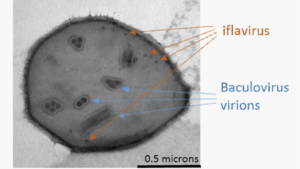Regular and natural production of « GM » butterflies by viruses associated with parasitic wasps
September 17, 2015What makes the Varroa parasite of honeybees resistant to chemical treatments?
May 18, 2016Hitchhiking in viruses
Host-to-host transmission and the prevalence of infection define the reproductive success of viruses. Research teams in Spain, Mexico and The Netherlands observed that one virus can apparently hitchhike a ride from one host to the next using the particles of other virus as their means of transport. This mechanism may be an effective means of improving virus survival in the environment and may also assist during the infection of each new host. The hitchhiking viruses, known as iflaviruses, are small viruses that infect insects. Iflaviruses comprise an RNA genome and a protein coat. These particles, measuring not more than 25 nm, were inferred to be physically associated with the particles of large DNA insect viruses, called baculoviruses.
Ref:
Iflavirus increases its infectivity and physical stability in association with baculovirus.
Agata K. Jakubowska, Rosa Murillo, Arkaitz Carballo, Trevor Williams, Jan W. van Lent, Primitivo Caballero and Salvador Herrero. PeerJ 4:e1687; DOI 10.7717/peerj.1687
https://peerj.com/articles/1687/

Media Coverage
- ScienceDaily: “Viruses hitch a ride to greater infectivity in insects” 15 April 2016
- Phys.org: “Viruses hitch a ride to greater infectivity in insects” 14 April 2016
- Pan European Networks: Science & Technology: “Iflaviruses – the hidden hitchhikers” June 2016